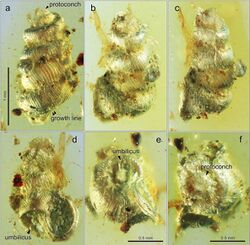Biology:Euthema
| Euthema | |
|---|---|

| |
| Holotype specimen of Euthema hesoana | |
| Scientific classification | |
| Domain: | Eukaryota |
| Kingdom: | Animalia |
| Phylum: | Mollusca |
| Class: | Gastropoda |
| Subclass: | Caenogastropoda |
| Order: | Architaenioglossa |
| Superfamily: | Cyclophoroidea |
| Family: | Diplommatinidae |
| Genus: | †Euthema Yu, Wang & Pan, 2018[1] |
| Species | |
|
See text | |
| Synonyms | |
| |
Euthema is a fossil genus of minute land snails with an operculum, terrestrial gastropod molluscs in the family Diplommatinidae from the Cretaceous Burmese and Hkamti ambers.
Species
As of 2021, 8 species are placed into Euthema:[2]
- E. annae Balashov, 2020:[3][4] described from the Cretaceous Burmese amber,[3][2][4] the species was first described in the paper published online by "Cretaceous Research" on October 16, 2020, which qualifies as a nomenclatural act under Article 8.5 of the ICZN when registered in ZooBank,[5] though the final version of the paper was published and printed in February 2021.
- E. dilatata (Yu, 2020), originally described as Truncatellina dilatatus[2]
- E. hesoana Asato & Hirano in Hirano et al., 2019
- E. lophopleura (Bullis, Herhold, Czekanski-Moir, Grimaldi & Rundell, 2020), originally described in the new genus Xenostoma[2]
- E. myanmarica Balashov, 2021 - species from Hkamti amber[2][6]
- E. naggsi Yu, Wang & Pan, 2018, type species
- E. spelomphalos (Bullis, Herhold, Czekanski-Moir, Grimaldi & Rundell, 2020), originally described in the new genus Paleodiplommatina[2]
- E. truncatellina Balashov, Perkovsky & Vasilenko, 2020[7][8][9]
Etymology
Euthema truncatellina is named after the extant genus Truncatellina (Stylommatophora), which has a similar shell, acknowledging the convergence in the different lineages of gastropods on land.[3]
Description
Euthema annae has a shell which is almost cylindrical with 6 weakly convex whorls, ribbed, with strong constriction. Aperture almost heart-shaped with parietal inclusion. Umbilicus narrow. Periumbilical keel weak. Height of shell 2 mm (0.079 in) tall and 1–1.1 mm (0.039–0.043 in) wide.[3][2]
E. myanmarica has a shell which is almost cylindrical, comprising 6 moderately convex whorls, ribbed, with weak constriction. The aperture is oval and the umbilicus wide, with a strong periumbilical keel. The shells are 2 mm (0.079 in) and 0.9 mm (0.035 in) wide.[2]
E. truncatellina has a shell which is almost cylindrical, comprising 6.5 moderately convex whorls, ribbed, with weak constriction. The aperture is circular, the umbilicus narrow, and the periumbilical keel is absent. The shells are 1.7 mm (0.067 in) and 0.9 mm (0.035 in) wide.[3][2]
References
- ↑ Yu, T.; Wang, B.; Pan, H. (2018). "New terrestrial gastropods from mid-Cretaceous Burmese amber". Cretaceous Research 90: 254–258.
- ↑ 2.0 2.1 2.2 2.3 2.4 2.5 2.6 2.7 2.8 Balashov, Igor (March 2021). "The first records of mollusks from mid-Cretaceous Hkamti amber (Myanmar), with the description of a land snail, Euthema myanmarica n. sp. (Caenogastropoda, Cyclophoroidea, Diplommatinidae)". Journal of Paleontology: 1–10. doi:10.1017/jpa.2021.26.
- ↑ 3.0 3.1 3.2 3.3 3.4 Balashov, I. (2020). "An inventory of molluscs recorded from mid-Cretaceous Burmese amber, with the description of a land snail, Euthema annae sp. nov. (Caenogastropoda, Cyclophoroidea, Diplommatinidae)". Cretaceous Research: Article 104676. doi:10.1016/j.cretres.2020.104676.
- ↑ 4.0 4.1 MolluscaBase - Euthema annae
- ↑ ICZN - The Code Online
- ↑ ZooBank - Euthema myanmarica
- ↑ Balashov, I.; Perkovsky, E.; Vasilenko, D. (2020). "A mid-Cretaceous land snail Euthema truncatellina sp. nov. (Caenogastropoda, Cyclophoroidea, Diplommatinidae) from Burmese amber". Zootaxa 4858 (2): 295–300. doi:10.11646/zootaxa.4858.2.11. PMID 33056238.
- ↑ MolluscaBase - Euthema truncatellina
- ↑ ZooBank - Euthema truncatellina
Links
Wikidata ☰ {{{from}}} entry
 |

